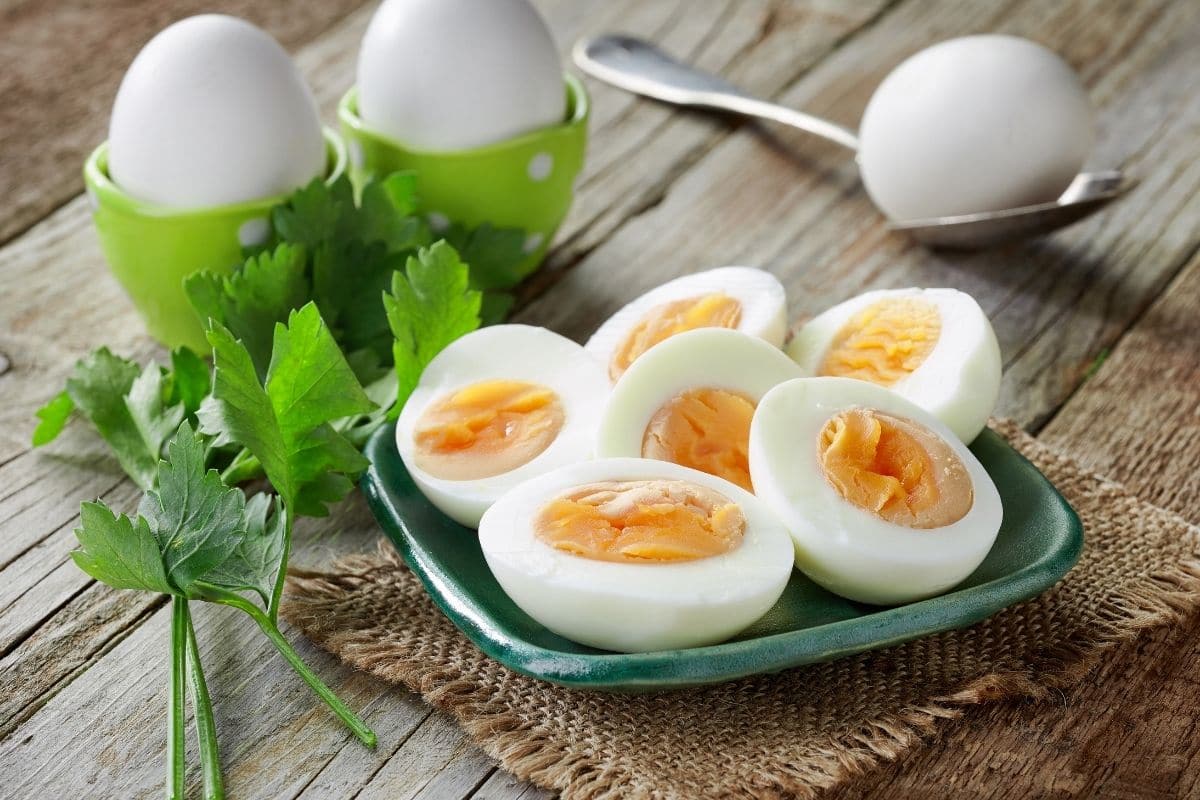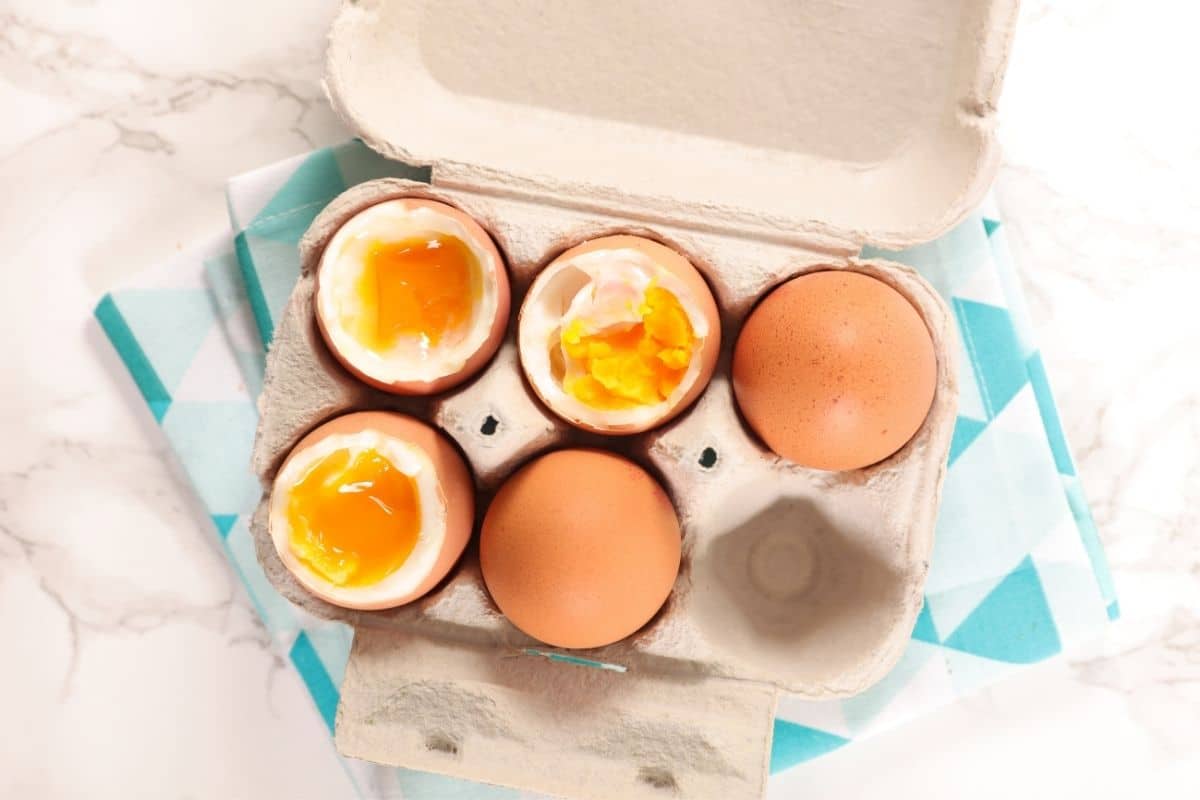Hard boiling eggs can go terribly wrong if you do not follow the right steps. In just minutes, you can end up with exploded eggs in your microwave, which is a pain to clean up.
Can you hard boil an egg in the microwave? YES, you can. We experimented with multiple eggs, cooking times, and cooling times to find the exact method to get hardboiled eggs right on the first try.

Making eggs in the microwave means less babysitting of a pot and a whole lot of effort with timing. Also, having hardboiled eggs on hand is helpful as eggs are high in protein and nutrients. You can add them to salads, eat them with toast, or even make egg salad. Kids can eat an egg after school for an affordable protein-filled healthy snack.
What You Need
Before you can boil eggs in the microwave, you need to gather the items you will need. Let’s discuss each item in detail so you can get your eggs right on the first try. As with most things, you may find different methods that work best for you and your needs but start with these as you know this method works and then experiment to find what works for you.
A Microwave
Microwaves differ in wattage available to power the cooking. The microwave we used is a 1,000-watt microwave. It’s best to have a microwave that spins to help circulate the temperature evenly. Check the wattage on your microwave and adjust the heat and time accordingly.
Keep in mind, that most microwaves are 1,000 watts to 1500 watts. Higher wattage microwaves will cook faster. Also, microwaves with convection or air frying ability built-in may function differently.
Microwave Safe Bowl
The first thing you need to microwave eggs is a microwave-safe bowl. Glass bowls are the easiest to use as they are safe for the microwave, and you can watch the eggs while they cook. Make sure to choose a bowl big enough for the eggs you plan to cook, specifically big enough to hold water that covers the eggs completely. (Please note, Pioneer Woman bowls are beautiful but not microwave friendly unless it specifically says it’s safe for the microwave).
Salt
Next, you need salt. The salt prevents the eggs from exploding in the microwave and helps them to cook evenly. Salt may help the shell to peel off easily too. Do not forget the salt, as you will have a massive smelly mess to deal with in your microwave. We recommend half a teaspoon per egg. You can add the salt before or after the water so long as you add the salt.
It’s best to use iodized salt for the eggs instead of other salts as it has more iodine and tends to work better than sea salt or Himalayan salt. Some people prefer to poke holes in the eggs to allow trapped air to seep out and prevent the eggs from exploding. However, this can easily break the egg and make a mess as the eggs slowly seep out.
Eggs

It’s hard to boil eggs without eggs! However, it’s best to let the eggs sit out until they are at room temperature before cooking. This can help to prevent the small bubbles and stop the eggs from cracking when the cold temperature quickly meets the hot temperature.
Before you need the eggs, take them out of the refrigerator and place them on a kitchen towel to dry and cool off to room temperature. You can wipe the eggs too to remove condensation as they cool. Once they are room temp, you can place them in the bowl with the hot water and salt to make them ready to go in the microwave.
If the eggs are not at room temperature, you can still microwave them, but you may have more complications. Also, the shell may be harder to deal with as well. Plan enough time to allow the eggs to cool for the most effective cooking.
You can use any kind of eggs you want. We used large eggs for this process, so you may need to make minor changes for smaller or larger eggs.
Hot Water
Finally, you will need hot water. Do not worry about boiling water; just turn on your sink and let the water get hot. Use that water to pour over the egg just enough to fully cover the eggs. Room temperature water can take longer and make it harder to peel the shell after the egg cools.
Bowl of Ice Water
You will also need a bowl that will not go in the microwave to hold the eggs for cooling. The bowl should be large enough to hold all the eggs along with ice cubes and water. Start with the coldest water possible from the sink. It does not matter if you put the water in or the ice first. When the eggs are done in the
How Long To Cook Eggs In The Microwave

1 Egg takes seven minutes in the microwave with room temperature water or six minutes with hot water from the tap. Let the eggs sit in the hot water for about 3 minutes before transferring to the cold water. Next, place the eggs in a bowl of ice-cold water. Wait for the egg to cool completely; about ten minutes is best to help the skin peel off easily.
2 Eggs take eight minutes with the eggs at room temperature and hot water from the faucet. Allow the eggs to cool for at least three minutes before transferring them to the bowl of ice-cold water. Wait for the eggs to cool fully in a bowl of ice water, so they are ready to eat and to help the shell peel off easily.
3 Eggs take 12 minutes in the microwave. Make sure the eggs are room temperature and use hot water from the sink. Let the eggs cool for about four to five minutes before transferring to a bowl of ice-cold water. Again, leave the eggs to cool in a bowl of ice water for about ten minutes to help the shell peel off easily.
4 Eggs cook in 14 minutes at room temperature in hot water from the tap. As always, allow the eggs to cool in a bowl of ice water for about ten minutes.
5 Eggs will take about 16 minutes in the microwave at room temperature with hot water from the sink. Then, allow to cool in ice-cold water for ten minutes.
6 Eggs take 18 minutes to cook in the microwave at room temperature with hot water from the faucet. Allow cooling in ice-cold water for ten minutes.
Larger batches of eggs in the microwave are not recommended. It can overheat the bowl too much, and there will not be enough room for the eggs to cook individually. Instead, only use the number of eggs that can fit at the bottom of the bowl without stacking eggs on top of each other.
Microwave Egg Texture
Not everyone wants their eggs hardboiled. Instead, some people may want their eggs medium or soft boiled. For medium-boiled eggs, take off one minute from the time listed above. To get soft-boiled eggs, take two minutes off the time listed above.
Additionally, if you want your eggs soft boiled, you can simply take them out of the microwave immediately and put them in the bowl of cold water to cool them down. Then, wait ten minutes to help the skins peel off properly. For medium-boiled eggs, you can use the same time but only let them sit in the water for a minute before taking them out of the hot bowl and transferring them to the ice-cold bowl of water.
Dealing with the Shell
Allow the eggs to cool completely if you want the shell to come off easily. If you are struggling, then the eggs did not cool in the water long enough. Soaking in the cold water should help the shell to break away from the egg, but this takes time, so plan for at least ten minutes.
Storing Hardboiled Eggs

Once the eggs are completely cooled, store them in the fridge. Use the egg carton if you can, and use a marker to label it as hard-boiled eggs to prevent accidentally reaching for the wrong eggs. You can also keep them in a bag or plastic container. You can store hard-boiled eggs in the fridge for up to a week.
Ensure the eggs are dry before putting them into the fridge, as this can affect the temperature and the texture. Additionally, it’s best to mark the date on the container as well, so you know when it’s time to toss the eggs to prevent illness.
You do not need to peel the shells off before storing them, as removing the shell may reduce the lifespan even if stored in the refrigerator. It’s best not to leave the eggs out on the counter as they can only maintain the correct temperature for about two hours. The danger comes when the temperature drops, as this can allow bacteria to grow quickly.
Eat the eggs with cracks in their shell first, as these will have a shorter life span. If you decide to serve the eggs, make sure to place them on a container with ice to keep the temperature steady. Remember to put them back in the refrigerator after two hours to prevent anyone from getting sick.
How to Boil Eggs in the Microwave
Prep Time: 10 Minutes
Cooking Time: 7-18 Minutes
Total Time: 27 or more minutes
Ingredients
- 1-6 eggs at room temperature
- 1/2 tsp of Iodized salt per egg
- Microwaveable bowl
- Bowl for cooling
- Hot water from the sink
- Coldwater from the sink
- Ice cubes
Instructions
- Place the room temperature eggs in the microwave-safe bowl with the salt and just enough hot water to cover all of the eggs completely. Keep all of the eggs unstacked at the bottom of the bowl.
- Find the correct cooking time for the number of eggs you are cooking. One egg 7 minutes, 2 eggs 9 minutes, 3 eggs 12 minutes, 4 eggs 14 minutes, 5 eggs 16 minutes, 6 eggs 18 minutes.
- While the eggs are cooking in the microwave, fill a bowl with ice cubes and water.
- When the eggs are done cooking, let them set in the water and microwave for a few minutes. For soft boiled, take the eggs out immediately and put them into the bowl of ice water. To get medium-boiled, leave the eggs in the hot water for one minute before transferring to the ice water. For hardboiled, leave the eggs in the water for up to five minutes.
- Leave the eggs in the ice water to cool for at least ten minutes. Feel the eggs and make sure they are cold; otherwise, the shell may be difficult to remove.
- Remove the shell and rinse the eggs to remove tiny shell particles. Now they are ready to enjoy.
Conclusion
So, can you hard boil an egg in the microwave? Yes, but make sure you take the proper precautions. The process takes several steps to complete. The most important step is to remember to put salt in the water to prevent the eggs from exploding. Also, it’s helpful and faster to use room temperature eggs and hot water from the sink for the best outcome.
With the right steps, you can have hard-boiled eggs in just a few minutes without a lot of work. The whole process takes about half an hour, including cooling time. All these factors depend on how many eggs you cook. Keep in mind, it’s best to keep the eggs all level and at the bottom of the bowl for even cooking. Now you know how to hard-boil eggs in the microwave. Happy microwaving and consider using the microwave to cook other eggs too like scrambled.




